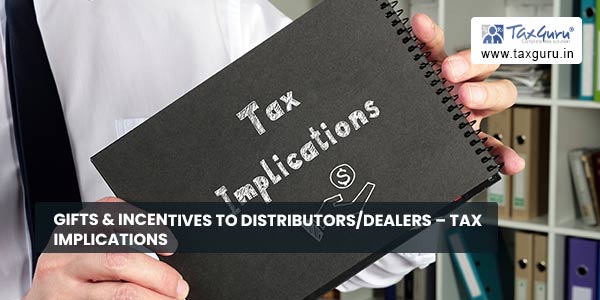Organizations have adopted various marketing strategies to boost sales in a consumer-oriented marketplace. To expand their customer base, they distribute goods or services as free samples or gifts. Such samples/ gifts are also known as ‘Business promotion.’ Further, distributors are often given additional goods free of cost, a sponsored foreign trip, gold coins, silver coins or certain home appliances when they achieve their sales target. Such expenses are incurred to increase the sales of the company. In this article, we discuss GST and TDS implications in such activities.
Let’s first understand from GST point of view, section 16 of GST Act gives conditions for availment of credit on goods/services used in course of business. Section 17(5) of the CGST Act sets out the blocked credit list. In section 17(5)(h), ITC shall not be available in respect of goods lost, stolen, destroyed, written off or disposed of by way of gift or free samples. Section 17(5) itself starts with a non obstante clause, which means even if Section 16 allows the credit, as conditions for taking of credit are satisfied, but Section 17(5) shall block the credit in respect of certain cases. Moreover, Section 17 (5) is a specific provision. It is an established principle that specific provision prevail over general provisions. This doctrine has always been upheld. We can also refer the advance ruling in the case “Biostadt India Ltd” which clearly states that ITC on “gifts” will not be available when no GST is being paid on their disposal.

From Income tax standpoint, a new section 194R is introduced in the budget 2022-23 which is now effective from 01st Jul 2022. It requires the deduction of tax at source at 10% by any person who provides any benefit or perquisite either in the form of cash or kind exceeding Rs 20,000 in a year (including the period 1st April 2022 to 30th June 2022) to a resident arising from the business or profession of such resident irrespective of the fact that such benefit is taxable in the hands of recipient or not. The benefits provider should deduct TDS under the said section only on the benefits or perquisites provided after 1st July 2022. This section will not be applicable in case of sales discounts, cash discounts and any rebates allowed to customers. For the valuation purpose, the fair market value (FMV) of the benefit or perquisite provided to the recipient shall be used. However, if the benefit or perquisite is purchased before providing it to the recipient, it will be valued based on its purchase price. If the benefit or perquisite is manufactured, it must be valued based on the price charged to the customers. If GST paid on item which is being offered as a benefit or perquisite then the GST should not be included in the valuation for the deduction of TDS.
In Further, any expenses incurred by a person in a business or a profession, if paid by the customer/service recipient, is in effect a benefit/perquisite provided by the customer/service recipient to the first-person during business/profession. However, if the business/service provider pays for the expenses and the same is reimbursed by the customer/service recipient, then it is not a benefit or perquisite, provided the invoice is obtained in the name of the customer/service recipient.





Good knowledge sharing thanks sonu.